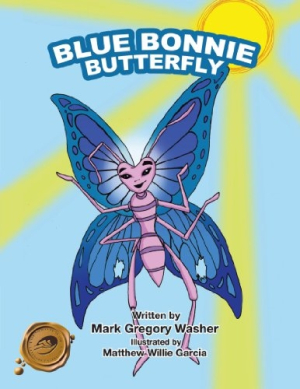Blue Bonnie Butterfly
Many children’s books take on the challenge of entertaining while educating or providing a moral. Mark Gregory Washer’s Blue Bonnie Butterfly aspires to teach not one moral, but several, as Blue Bonnie Butterfly learns to “Be happy with who you are,” that “Everyone has a special talent,” and “Everyone is GOOD at something. Keep TRYING!”
Unfortunately, Bonnie Butterfly wishes she could swim like a fish. She flies to the lake to see Tanya Turtle, who has the life Bonnie aspires to, and the turtle says, “With fish underwater I spend half my days. / The other half sunning in God’s warming rays.” But Tanya isn’t happy either—she wishes she could fly like an eagle. Bonnie and Tanya finally decide to be happy with their own abilities: “Even though you can’t fly, even though I can’t swim. / Tonight when we sleep we can have a sweet dream!”
Blue Bonnie Butterfly is written in rhyming couplets, which helps move the story along, despite a few spots where typographical errors or missing punctuation might otherwise stall the reader’s progress. In a book with around twenty words per page, missteps due to editing or proofreading are difficult to overlook. The artwork, too, is generally good, but there are a couple of confusing storytelling choices. For example, the book includes a picture where a flying Bonnie seems to be watching another Bonnie swimming. Some children might discern that the swimming Bonnie is imaginary, just a dream. But with no thought balloons, such an image within the first few pages of the book could leave young readers wondering what’s going on.
Despite these flaws, Blue Bonnie Butterfly might hold together if it had only one unifying message. But stuffed with messages about overcoming adversity, learning to love ourselves, and remembering to hold on to our dreams, a reader might be left wondering if it’s acceptable that Bonnie and Tanya are content. Isn’t that giving up, rather than overcoming adversity and holding on to one’s dream? Shouldn’t she “Keep TRYING!”? There’s a simple, not-so-flashy moral about accepting limitations here that works nicely, but it is surrounded by message clutter.
Mark Gregory Washer, who works as a mechanic in a Kansas tire factory, has written his first children’s book. The goals are admirable and the effort sincere, but the result comes up a bit short.
Reviewed by
Peter Dabbene
Disclosure: This article is not an endorsement, but a review. The publisher of this book provided free copies of the book and paid a small fee to have their book reviewed by a professional reviewer. Foreword Reviews and Clarion Reviews make no guarantee that the publisher will receive a positive review. Foreword Magazine, Inc. is disclosing this in accordance with the Federal Trade Commission’s 16 CFR, Part 255.

